No, a cat won’t eat their kittens if you touch them.
A mother cat killing or eating her kittens is a very rare behaviour that may occur if the kitten is stillborn, deformed, or has birth defects.
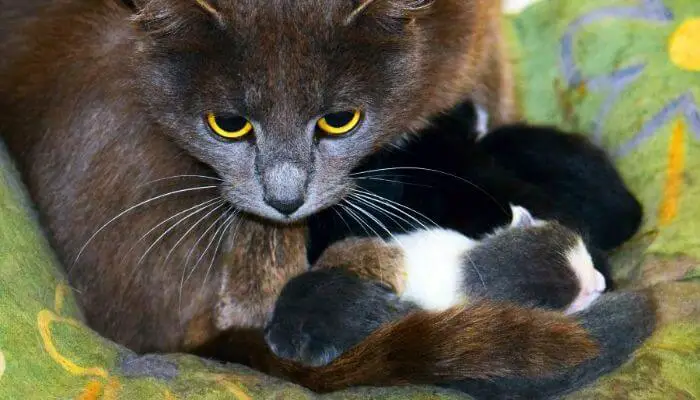
It can also happen if the mother cat is severely stressed.
This unlikely scenario may only happen if you are excessively handling the kittens or stressing the mother.
If you handle the kittens briefly and keep them close to the mother while doing so there should be no issues.
As newborn kittens are extremely fragile and going near them can stress the mother, it is best to avoid handling or touching the kittens during the first couple of weeks.
During this time, only touch or handle the kittens if there is a good reason to do so.
Contents
Why It Is Important To Take Care When Handling Kittens
If you handle the kittens when the mother cat is not happy with you doing so it can make her feel threatened, agitated and may make her move her kittens to a new location.
If you have been checking up on the mum and kittens and notice they aren’t in the same place anymore it is probably because the mother has moved them all to a new, safe location.
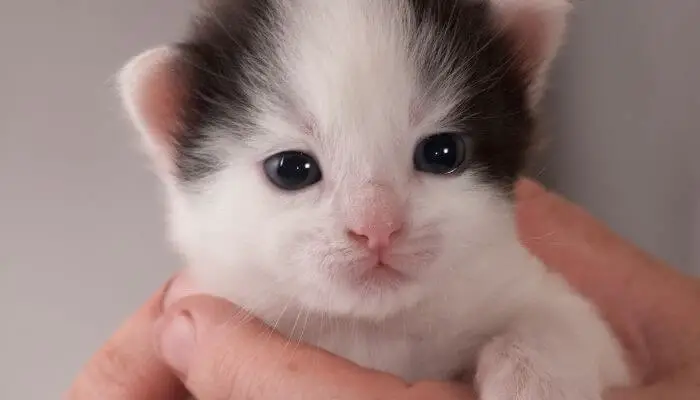
In addition to stressing out the mum, the young kittens are more susceptible to infection and disease so handling them can put them at risk.
While kittens are extremely cute, these early days are a tense time for the mother and the young kittens so it is best if you keep your distance.
Be considerate of the mother and only do what she is happy with.
As the kittens get a bit older and the new mum finds her feet you may find she is more open to having you around.
How To Pick Up Kittens Safely
It’s best to leave the kittens alone while their eyes are still closed.
During this time, it is important to only handle them if there is an urgent reason to do so.
Generally, mother cats tolerate their newborn kittens being briefly held for a quick health check (weighing them, checking for a bleeding placenta/ birth membranes in the mouth etc.) and to check the kitten’s gender.
These are basic checks that will only take a short amount of time.
If you are picking up a kitten to perform these checks make sure you:
- Wash your hands thoroughly before picking the kitten up
- Pick the kitten up with 2 hands and fully support their weight
- Hold the kitten close to your chest
- Don’t take the kitten out of the mother cat’s sight
Some mums are very protective and won’t let you near the newborn kittens without becoming stressed and defensive.
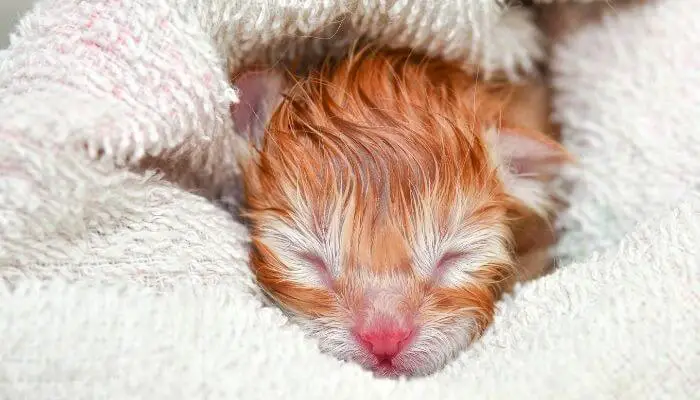
In this case, leave the kittens alone if you can see they are all doing well (breathing, moving, suckling, etc.).
Reasons For Handling A Newborn Kitten
While it is best to avoid touching newborn kittens, there are a few reasons you may need to check and touch the kittens.
For example:
- If the mother is having birthing difficulties and you need to get her (and her kittens) to the vet
- If the kittens aren’t moving, breathing, or their lives are at risk
- If the kitten is born in the sac
- If the kitten hasn’t suckled within the first 2 hours after birth
- If a kitten is cold and shivering
- If the kittens are not being looked after by the mother
Hopefully, there will be no need to touch the kittens but be observant of the mother and the kittens just in case.
Stay nearby so you can keep an eye on the cats but don’t be intrusive if your assistance is not needed.
When To Leave The Kittens Alone
It’s common for people to want to handle the kittens but, unless they need your help, it is better not to touch or handle them for the first few weeks.
If the kittens are suckling the mum, are in a safe, secure place and the mother is being attentive then you should leave them alone.
Once the kittens are a bit older and have their eyes and ears open you can begin to briefly handle the kittens to help them get socialised and familiar with people.
When It Is Safe To Handle Kittens
After the kittens have opened their eyes, you can begin to handle them if the mother allows you to.
Before you touch the kittens, let the mum sniff your hand and gentle pet her so she knows you are not a threat.
If the mother cat welcomes the petting then you can carefully pick up one of the kittens.
If the mother is stressed by your presence or her demeanour changes while you are there then it is best to work on things more slowly so she knows you are not a threat.
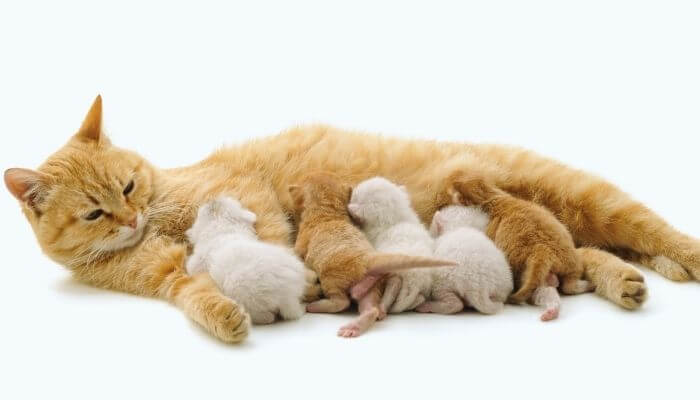
Different cats react differently to this situation so always keep an eye on your cat’s behaviour and respect her.
Remember that cats have strong maternal instincts and if the mother feels threatened she may attack you to get you away from her kittens.
If all is well and the mother lets you handle the kittens, make sure the kitten you are holding is kept warm.
Due to their small size, kittens can become cold quickly and can develop hypothermia.
Most of a young kitten’s energy is used trying to stay warm. Keep this in mind any time you pick up a kitten.
Only hold them for a short period before returning them to the safety and warmth of the mum and other littermates.
Keep the kittens close to their mum at all times, making sure the mum can see her kitten to avoid unnecessary stress.
Newborn kittens are fragile and they haven’t got well developed immune systems yet so always be gentle and handle them with clean hands.
Rough handling can damage their bones or vital organs so be very careful.
Why Handling Older Kittens Is Important
Handling and socialising the kittens isn’t important until their eyes and ears open when they are around 2 weeks old.
At this point, the kittens should be gently held by a range of different people to help them socialise and get used to people being around.
This simple socialisation can help them grow up to be friendly, well-adjusted cats.
Rules When Handling Kittens
- Always be gentle
- Always fully support the kitten
- Stay close to the mother
- Make sure the kitten is warm
- Don’t allow small children to handle the kittens and only let older children handle them with supervision
Will The Mother Cat Eat Her Kittens?
There are times when a mother cat will eat their kittens, however this is very rare.
A mother won’t eat her kittens because you have handled them unless you have handled them excessively or the mother cat thinks of you as a threat.
A mother cat eating her kitten(s) typically happens if the kitten is stillborn, deformed, or has birth defects.
It can also happen if the mother cat is severly stressed.
Reasons A Mother Cat May Eat Her Kittens
While it is unlikely for a mother cat to eat her kittens because you have handled them, there are a few other reasons:
- If the kitten is sick
A kitten that is sick, born with birth defects or stillborn may be eaten by the mother for hygiene purposes.
They may also be rejected or neglected due to their health problems.
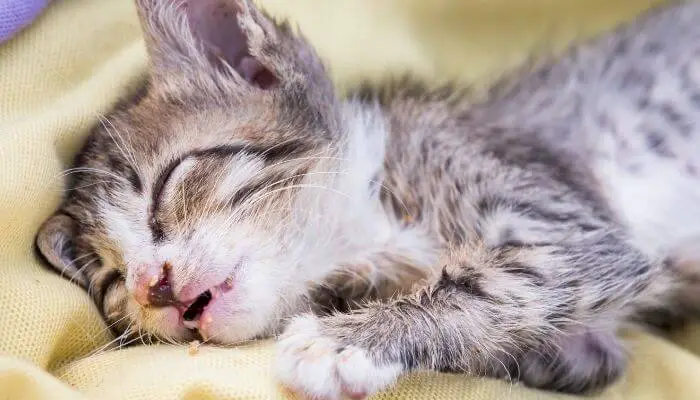
The mother cat may even remove a sick kitten from the litter and leave the kitten in another area.
If a kitten is rejected by the mother, this is a good time to intervene, have the kitten checked by a vet and care for the kitten separately.
- If the mother cat is stressed or feels threatened
If the mother cat is stressed or anxious they may eat her kittens.
Stress can be caused by loud noises, too many people around and potential exposure to predators.
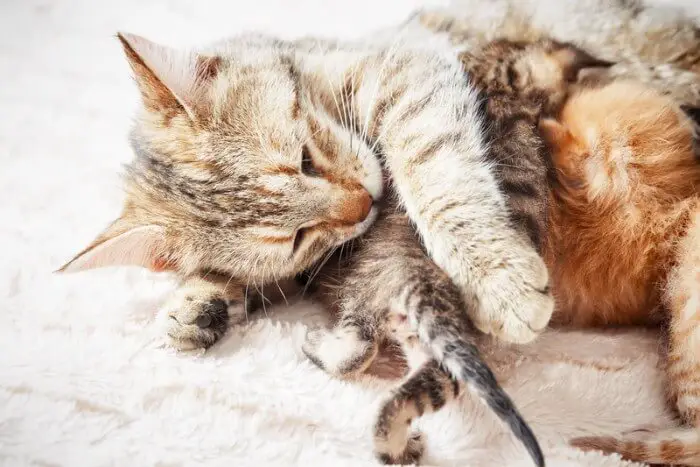
If the mother feels threatened (this can be due to other pets, animals or people nearby) then she may eat her kittens.
To prevent this from happening make sure the cats have a safe, secure and quiet place.
- If the mother cat is malnourished
A malnourished mother cat may eat one or two kittens to help her have the nutrients and energy she needs.
This behaviour is instinctive and can be prevented by ensuring the mother is well-fed with a diet suitable for a pregnant or nursing cat.
- If the mother cat is suffering from feline mastitis
If the mother’s mammary glands become infected it means nursing the kittens will be very painful.
It can also be dangerous for the kittens as the infection can be passed to them during nursing.
If you notice the mama has mastitis, it is best to separate her and the kittens and consult a vet so the condition can be treated.
- If the mother cat doesn’t recognise the kittens
In some cases, the mother cat may not recognise her kittens.
This can happen if she gave birth through a cesarean section as the birth-related hormones are not naturally released which can confuse the mother.
If the kittens are frequently held and moved around by humans it can cause the mother to become stressed, threatened or mean she does not recognise her kittens.
This is why it is important to be careful when handling the kittens and always do so briefly and under the watchful eye of the mother.
How To Know If The Mother Has Accepted The Kittens
If you have had to handle a kitten due to an emergency and you are now worried about the mother rejecting them, simply place the kitten back with the mother and keep a close eye on them.
It’s best if you position the kitten close to the mother and in a way that they can easily start nursing.
If the mother is licking the kittens and displaying maternal behaviours and the kittens are nursing then the kittens have been accepted.
Summary
We know how tempting it is to check on your cat and her new litter of beautiful kittens but it’s best to leave them in peace.
It’s okay to briefly hold newborn kittens to check their health and gender but if the new mum is being attentive and maternal then you should leave them to it.
Observe the new family from a distance and take note of the mother’s behaviour towards you.
A mother cat will not eat her kittens because you have handled them but she will find the situation stressful so if you have to handle the kittens do so carefully.

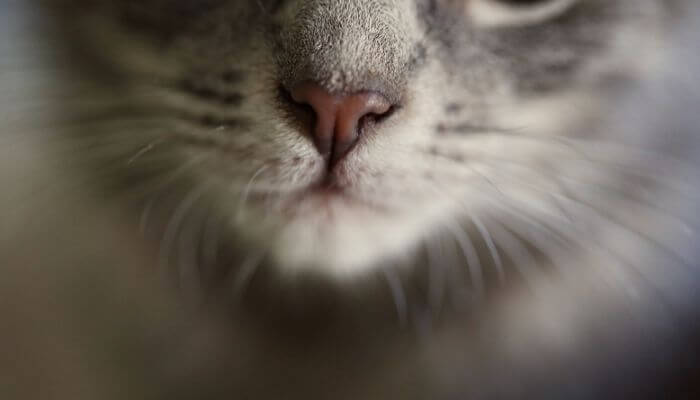

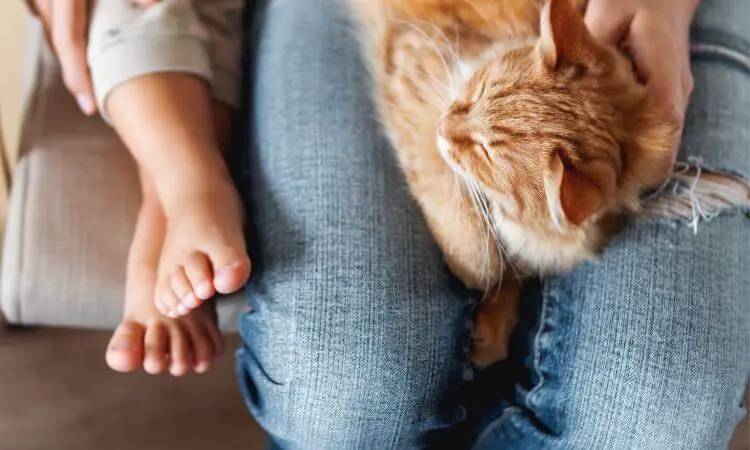
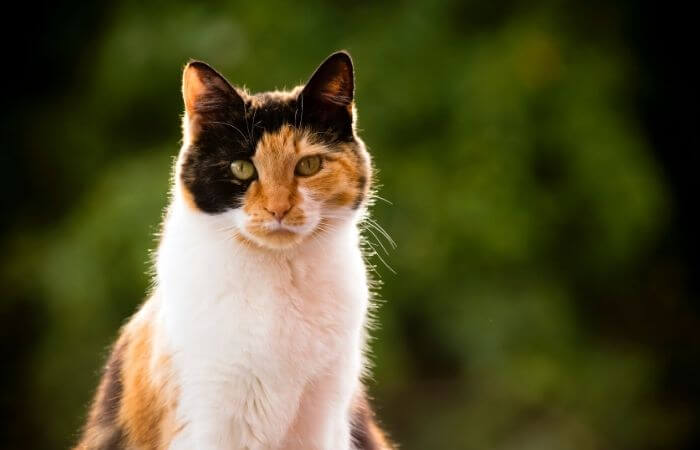
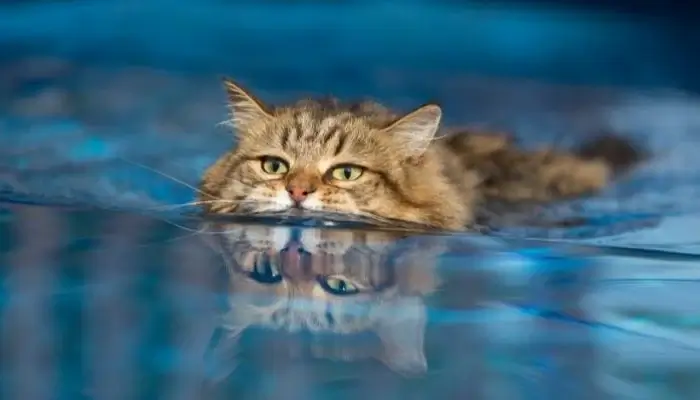
Leave a Comment